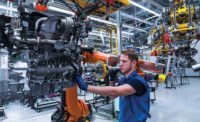‘DIAZI’ Project Turns Production Plants into Digital Factories

A new initiative in Germany is helping automotive manufacturers evolve into the digital world. Illustration courtesy Continental AG
BABENHAUSEN, Germany--Digitalization of the Industrialization Process in the Automotive and Supplier Industries (DIAZI) is a new three-year project being spearheaded by Continental AG. The goal of the initiative is to help automotive manufacturers thrive in the digital world.
In the future, new production lines will be planned, simulated and operated digitally, increasing the efficiency, flexibility and cost-effectiveness of automotive plants. That will allow them to keep pace with faster development cycles, complex supply chains and changing customer requirements.
Continuous data analysis of all production processes will help to continuously optimize automotive plants, make accurate productivity predictions and minimize downtimes. To spearhead the project, Continental has formed a consortium with eight German IT and process optimization companies, universities and startups.
“DIAZI is a major step toward the digitalization of the automotive industry,” explains Thomas Ebenhöch, head of operations for the User Experience business unit at Continental Automotive. “As the lead company in the DIAZI project, [we are] driving a new approach to effective and sustainable production processes in the automotive and supplier industries.
“Through digital simulation, artificial intelligence and data management in the cloud, we’re bringing innovations to market faster, more efficiently, more sustainably and more cost-effectively across the manufacturing industry,” says Ebenhöch. “Early results show we’re on the right track. Our vision of the digital factory is clearly taking shape.”
According to Ebenhöch, the infrastructure of the automotive industry will benefit greatly from a digital update. “In view of the increasing competition in key technologies, a holistic, digitally driven approach to optimizing industrialization processes is increasingly important,” he points out. “This is the only way to adapt to increasing customer requirements and faster development cycles.”
The DIAZI project’s vision of a “digital factory” is a fully digitalized production environment in which new production lines are digitally planned and production processes are simulated. In this way, new production plants can first be started up virtually before commissioning.
Driven by artificial intelligence, this step makes it possible to continuously optimize processes, make accurate productivity predictions and minimize downtime thanks to in-depth data analysis of all machines. Various production plants of a company, as well as production sites of suppliers, can be connected to ensure fast, scalable, high-quality production.
“The dynamic transformation of the automotive sector into a highly digitalized industry offers enormous potential,” claims Ernst Stöckl-Pukall, head of digitalization and Industry 4.0 at the Federal Ministry for Economic Affairs and Climate Action, which is funding the DIAZI project. “Cooperation across company boundaries represent a key component for the entire industry.
“The findings from the project have the potential to be adapted to numerous companies and production lines, and serve as an impulse generator for fully digitalized and AI-supported production processes,” says Stöckl-Pukall.
Looking for a reprint of this article?
From high-res PDFs to custom plaques, order your copy today!






